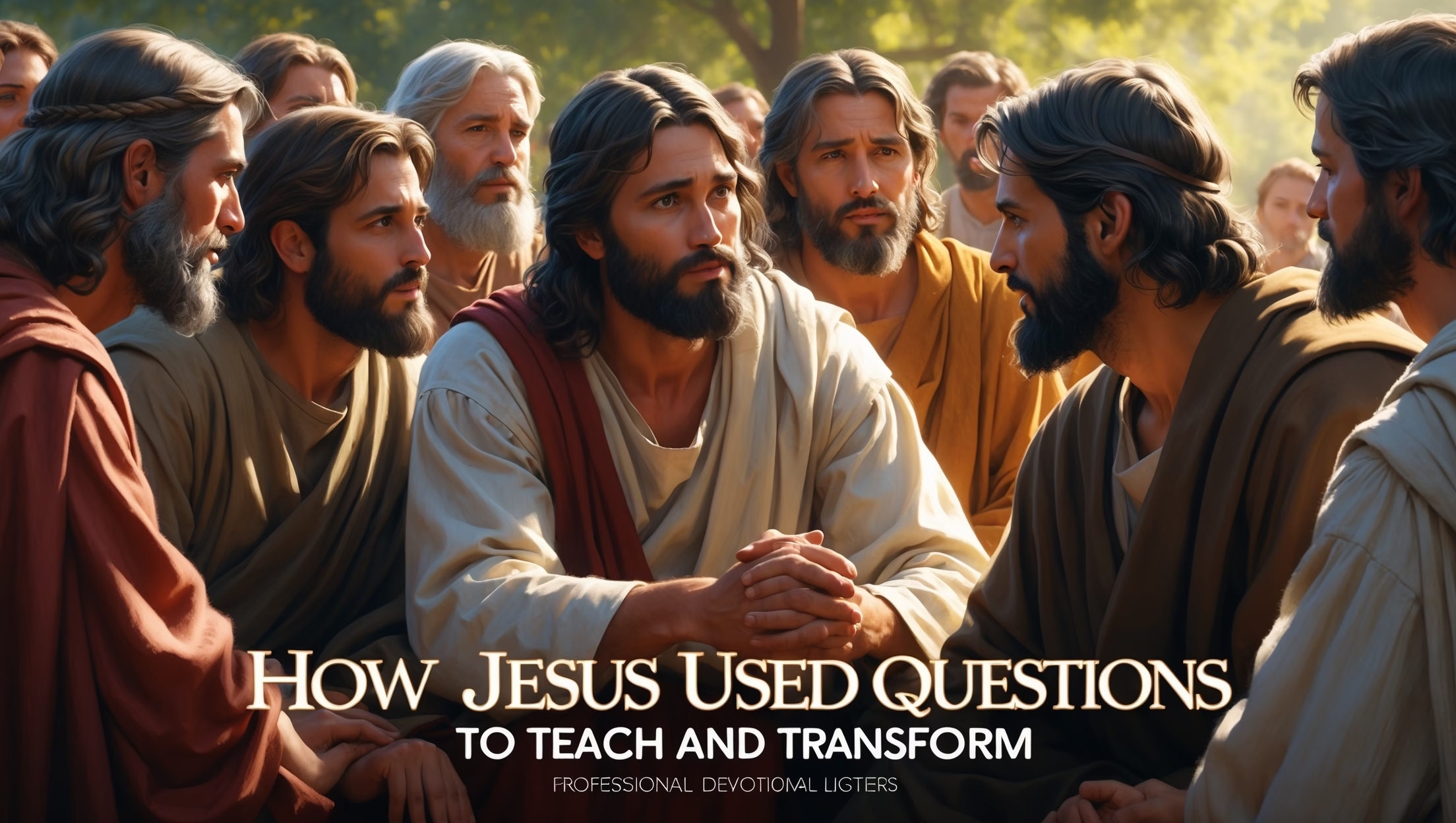Introduction
Jesus’ teaching style was radically different from the common methods of His time. Rather than relying solely on direct instruction or long discourses, He frequently used questions as a central tool in His ministry. These questions were not mere conversation starters—they were deliberate, strategic, and transformative. By asking questions, Jesus invited reflection, challenged assumptions, and prompted His listeners to encounter truth personally. This method engaged both the mind and the heart, encouraging active participation rather than passive reception. Understanding how Jesus used questions provides valuable insight into His pedagogy, His relational intelligence, and His ability to draw people into spiritual growth.

Questions That Revealed Identity
One of the most profound ways Jesus used questions was to reveal His identity and provoke self-reflection among His followers. In Matthew 16:15, He asked His disciples, “Who do you say I am?” This question was more than curiosity; it compelled His disciples to articulate their understanding of Him and confront the reality of His divine mission. Peter’s response, declaring Jesus as “the Christ, the Son of the living God,” demonstrated that Jesus’ questions could lead to confession, clarity, and the deepening of faith.
By asking such questions, Jesus encouraged active engagement with spiritual truths. Instead of telling His followers who He was, He prompted them to wrestle with the evidence of His ministry, His miracles, and His teachings. In doing so, He fostered a faith that was reflective, personal, and resilient—grounded in their own experience and understanding rather than passive acceptance.
Questions That Challenged Hypocrisy
Jesus’ questions were also instrumental in exposing hypocrisy and challenging religious pretension. He often confronted the Pharisees and scribes with pointed inquiries that revealed their misplaced priorities and hidden motives. For example, He asked, “Why do you break the command of God for the sake of your tradition?” (Matthew 15:3). This question forced the religious leaders to examine their actions and highlighted the tension between human traditions and divine commandments.
Through such questioning, Jesus did not merely accuse; He invited reflection. His questions functioned as mirrors, reflecting the hearts and intentions of those who heard them. They prompted a critical evaluation of their beliefs and practices, compelling people to confront inconsistencies in their spiritual lives. By using questions rather than direct condemnation, Jesus combined confrontation with the potential for transformation.
Questions That Inspired Faith
Another remarkable aspect of Jesus’ questioning technique was its power to inspire faith. When He encountered a blind man, He asked, “What do you want me to do for you?” (Mark 10:51). Rather than presuming to know the man’s needs or automatically healing him, Jesus invited personal expression of faith. This question created space for the blind man to articulate his hope, desire, and dependence on Christ, which in turn deepened his trust and engagement in the healing process.
Jesus’ approach demonstrates that questions can encourage active participation in spiritual experiences. They draw individuals into self-awareness and reliance on God, fostering faith that is both personal and dynamic. By prompting reflection and response, Jesus’ questions functioned as catalysts for spiritual growth, inviting those He encountered to step into the work of God in their own lives.
Questions That Comforted and Restored
Jesus also used questions to comfort, restore, and redirect those who had failed or stumbled. After His resurrection, He asked Peter three times, “Do you love me?” (John 21:15–17). This repetition was deliberate and symbolic, reflecting Peter’s threefold denial. Each question allowed Peter to reaffirm his love, face his past failures, and receive restoration. Through this method, Jesus transformed guilt into renewal and commissioned Peter for future leadership.
Questions in this context were not about testing knowledge or exposing weakness; they were about guiding restoration. Jesus’ questions created opportunities for accountability, reconciliation, and renewed purpose. They illustrate that asking thoughtful, loving questions can heal, restore confidence, and redirect lives toward meaningful service.
Application for Today
Jesus’ use of questions provides a model for modern teaching, leadership, and spiritual formation. His method demonstrates the value of dialogue over monologue, reflection over passive reception, and engagement over compliance. Questions encourage self-examination, foster critical thinking, and create space for personal conviction.
In personal relationships, ministry, and education, employing thoughtful questions can guide others to deeper understanding. Leaders can learn to ask questions that reveal potential, challenge assumptions, and nurture growth rather than simply providing answers. Spiritual mentors and teachers can emulate Jesus by fostering inquiry that draws people closer to God and encourages authentic transformation.
Moreover, Jesus’ example reminds us that questions can be a tool of love and restoration. They can comfort the brokenhearted, redirect those who have erred, and guide people toward deeper faith and understanding. Using questions with empathy, timing, and discernment reflects the relational wisdom that characterized Jesus’ interactions.
Conclusion
The questions of Jesus were more than conversation—they were instruments of revelation, confrontation, inspiration, and restoration. By asking questions, He helped His followers discover truth for themselves, confront hypocrisy, inspire faith, and find comfort and restoration. His teaching method was relational, engaging, and transformative, demonstrating that the right question can change hearts and lives.
Today, we can learn from Jesus’ approach, recognizing the power of questions to draw people into reflection, growth, and deeper connection with God. Whether in personal relationships, teaching, or spiritual guidance, asking thoughtful, intentional questions can mirror the way Jesus led, challenged, and restored. His questions continue to speak across the centuries, inviting each of us into a deeper encounter with truth, faith, and the transforming presence of God.










